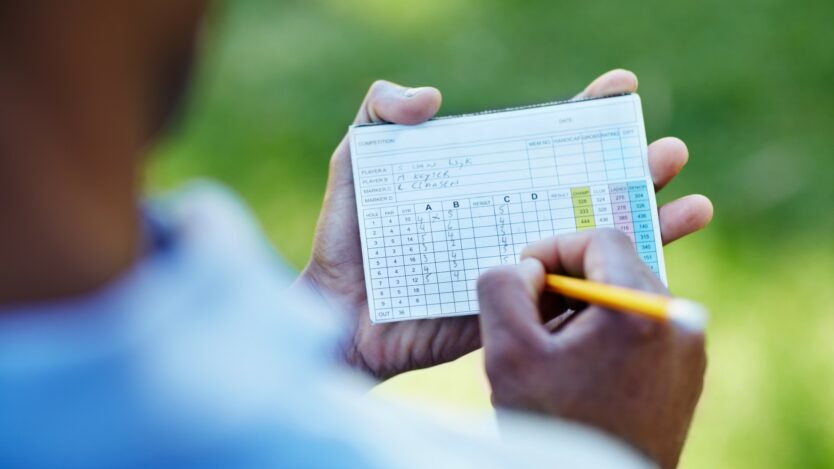As much as some want to keep denigrating the global network, there are signs it’s starting to change the way we play the game.
This article is part of GCMA Insights – topical content for golf industry professionals, discussing the things that matter to those who work in golf clubs.
These are heady days for the World Handicap System. Yes, critics remain – and some of them are very shouty indeed in the internet corners they inhabit. But while Mark Twain popularised the saying ‘there are three kinds of lies: lies, damned lies, and statistics’ there are some numbers it’s hard to ignore.
When England Golf announced it had been a record-breaking year, the headline of more than 10 million scores submitted into WHS during 2024 naturally gained headlines.
But there was more. Nine-hole golf is proving ever more popular, and the numbers of general play scores pushed into boxes or submitted into computers was more than half a million up on 2023.
Richard Flint, England Golf’s chief commercial officer, said the figures showed the governing body’s drive to increase participation in the game, and a key focus on inclusion and accessibility, was paying dividends.
It’s not just in Shakespeare’s sceptred isle, though, where officials can be buoyant about WHS. Look at the United States and you’ll see similar positivity.
USGA statistics show there are 200,000 more golfers with handicaps in 2024 compared with 12 months previously. Go back to 2020 and it’s an extra 735,000.
Get involved in the debate.
To join the GCMA, click here, or to organise a call with a call with a member of the GCMA team, just complete the form below.
While most of those are male, there are more females playing too and the number of 9-hole scores is also rocketing across the pond – up nearly four million on 2020 to 14.1 million scores submitted in 2024.
Back to England, and still there is more. Those who are critical of the WHS will tell you players are so disenchanted with its perceived favouring of low handicappers they are abandoning competitions.
It must be a surprise then to see the number of such scores recorded in the country actually increasing. There were 272,284 more competitive scores entered in 2024 than the year before. Are they only being put in by high handicappers suitably encouraged by the notion they can’t fail to win a prize? It’s unlikely that’s the answer.
If people are disenchanted, if they’re sulking rather than putting their handicaps to the test, that’s not being reflected in the figures.
But the biggest thing for me to come out of England Golf’s annual data dump could suggest something more profound. If these numbers hold up to scrutiny, it may reveal that the way we are playing the game is starting to change.

What’s made the implementation of the WHS particularly toxic in Great Britain & Ireland, rather than in some other parts of the world, has been that fixation with competition golf.
We used to sculpt our year around a traditional campaign, from the start of April until the end of October, and made it impossible to have a handicap that wasn’t shaped in competitive events.
Supplementary cards became available in the CONGU system’s latter death throes, but they were used selectively and under strict controls. They weren’t even available to Category 1 golfers.
England Golf say just four per cent of scores submitted in 2019 came from supplementaries. It has been quite the change since.
WHS clearly encourages general play scores, and the system gives us a freedom never possible before its introduction.
And though we know just over 10 million scores were submitted in 2024, it must be conceded that we have no real way of measuring how many other casual rounds were played at clubs – in roll-ups, swindles, team events, scrambles – that don’t feature in any player’s handicap records.
Even so, there is a significant shift going on in the numbers of competition rounds submitted compared with general play scores.
WHY JOIN THE GCMA?
Membership of the GCMA unlocks a network of like-minded professionals, provides you with support in your professional and personal development, and provides you with a multitude of benefits. Whether that’s the tools that will help you to excel in your profession, or a wide range of services to support your wellbeing, signing up to the GCMA is joining a community.
From that base of just four per cent in 2019, the percentage of comps to general play was 70-30 in favour of the former in 2021, 58-42 in 2023 and 56-44 last year.
Handicap chiefs in the UK have long stressed a desire for golfers to decouple thoughts about their indexes away from competitions. ‘Scores are just scores’ is the mantra.
While competitions remain the primary way of recording a score for our handicaps, and as said earlier are still on the rise, we don’t need to look too far into the future to see a time when they will be eclipsed by general play.
That will be the point the R&A and USGA can justifiably claim the game has become more accessible – with handicaps a universal right for golfers rather than controlled by the whim of clubs and competition play.
The grumbling about WHS won’t be going away any time soon, but these figures – more golfers, more handicaps, more rounds played, and more scores entered – point to a system that’s starting to do what it intended.
It will be one in the eye for those vainly continuing to hope it will be consigned to the dustheap.
This article is part of GCMA Insights – topical content for golf industry professionals, discussing the things that matter to those who work in golf clubs.
Insights Signup
"*" indicates required fields



